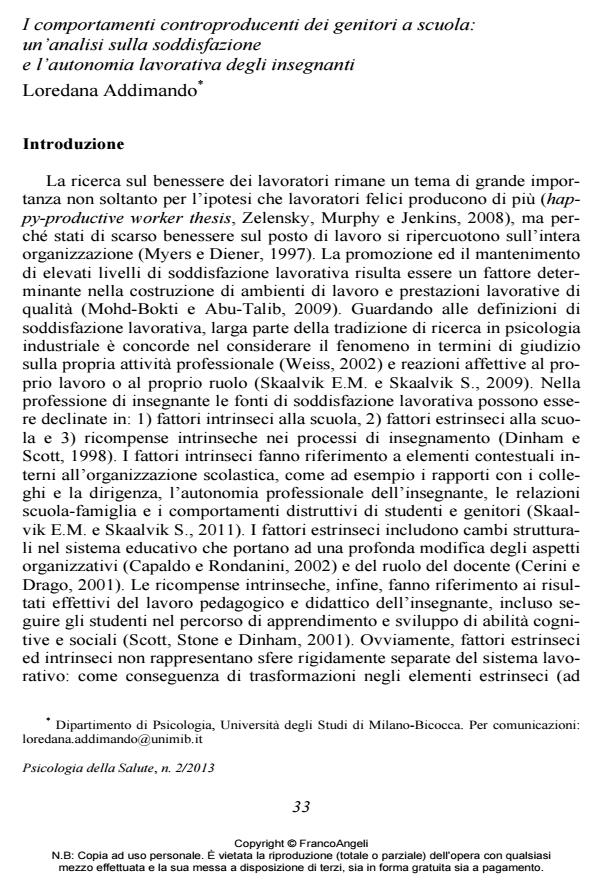I comportamenti controproducenti dei genitori a scuola: un’analisi sulla soddisfazione e l’autonomia lavorativa degli insegnanti
Titolo Rivista PSICOLOGIA DELLA SALUTE
Autori/Curatori Loredana Addimando
Anno di pubblicazione 2013 Fascicolo 2013/2
Lingua Italiano Numero pagine 19 P. 33-51 Dimensione file 373 KB
DOI 10.3280/PDS2013-002004
Il DOI è il codice a barre della proprietà intellettuale: per saperne di più
clicca qui
Qui sotto puoi vedere in anteprima la prima pagina di questo articolo.
Se questo articolo ti interessa, lo puoi acquistare (e scaricare in formato pdf) seguendo le facili indicazioni per acquistare il download credit. Acquista Download Credits per scaricare questo Articolo in formato PDF

FrancoAngeli è membro della Publishers International Linking Association, Inc (PILA), associazione indipendente e non profit per facilitare (attraverso i servizi tecnologici implementati da CrossRef.org) l’accesso degli studiosi ai contenuti digitali nelle pubblicazioni professionali e scientifiche.
La soddisfazione lavorativa è un tema di importanza sostanziale nella vita quotidiana di ognuno. Kahneman e Krueger hanno dimostrato come tale costrutto sia un predittore del benessere generale degli individui. Nell’ambito della professione dell’insegnante, la soddisfazione lavorativa rappresenta un fattore di protezione dallo stress lavoro correlato ed è in grado di attenuare le situazioni di malessere in risposta ai comportamenti "controproducenti" (counterproductive behaviors) dei genitori a scuola. La continua esposizione ai comportamenti controproducenti dei genitori può indebolire le risorse fisiche ed emotive dell’insegnante ed abbassare i livelli di soddisfazione lavorativa. Il presente studio esplora la relazione tra soddisfazione lavorativa, comportamenti controproducenti dei genitori e alcune variabili organizzative e personali dell’insegnante in un campione di scuola primaria e secondaria di primo grado (N = 1025) della Lombardia. È stata condotta un’analisi discriminante utilizzando come variabile di classificazione la soddisfazione lavorativa. I risultati mostrano che la funzione discriminante predice il 76.9% dei casi nei gruppi . Tra i comportamenti controproducenti dei genitori, le variabili non cooperativo e non coinvolto sembrano caratterizzare il gruppo di insegnanti insoddisfatti mentre la variabile iperprotettivo non contribuisce in maniera significativa alla funzione discriminante. Le implicazioni dello studio vengono discusse alla luce delle ricadute empiriche sui percorsi di formazione dei docenti. In particolare, per incrementare i livelli di soddisfazione degli insegnanti sembra utile concentrare gli interventi sulla relazione con i genitori e in particolare con quei genitori che dimostrano di non essere cooperativi.
Parole chiave:Soddisfazione lavorativa degli insegnanti, comportamenti controproducenti, coinvolgimento genitoriale, analisi discriminante
- The Development and Psychometric Properties of the Teacher Social Stress Scale-Student Related (TSS-Sr) Stefano Taddei, Bastianina Contena, Alessandro Pepe, Eva Venturini, in Scandinavian Journal of Educational Research /2019 pp.272
DOI: 10.1080/00313831.2017.1336481 - Measuring teacher job satisfaction: Assessing invariance in the Teacher Job Satisfaction Scale (TJSS) across six countries Alessandro Pepe, Loredana Addimando, Guido Veronese, in Europe’s Journal of Psychology /2017 pp.396
DOI: 10.5964/ejop.v13i3.1389 - The Effect of Positive Working Conditions on Work Engagement and Teaching Classroom Practices: A Large Cross-Sectional Study in Switzerland Loredana Addimando, in Frontiers in Psychology 2129/2019
DOI: 10.3389/fpsyg.2019.02129 - Teacher-parent relationships: influence of gender and education on organizational parents’ counterproductive behaviors Alessandro Pepe, Loredana Addimando, in European Journal of Psychology of Education /2014 pp.503
DOI: 10.1007/s10212-014-0210-0 - Assessing a (gifted) child in parent-teacher conference Letizia Caronia, Chiara Dalledonne Vandini, in Language and Dialogue /2019 pp.125
DOI: 10.1075/ld.00035.car
Loredana Addimando, I comportamenti controproducenti dei genitori a scuola: un’analisi sulla soddisfazione e l’autonomia lavorativa degli insegnanti in "PSICOLOGIA DELLA SALUTE" 2/2013, pp 33-51, DOI: 10.3280/PDS2013-002004